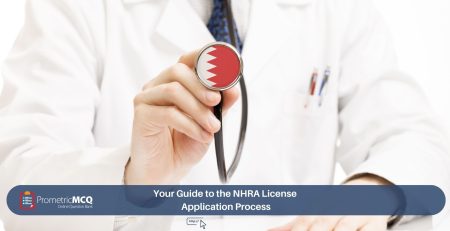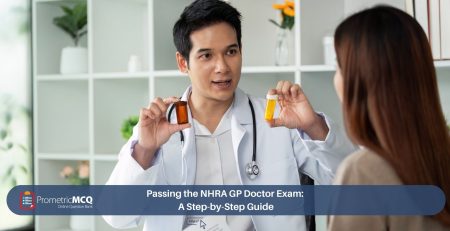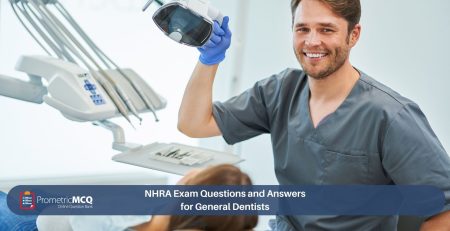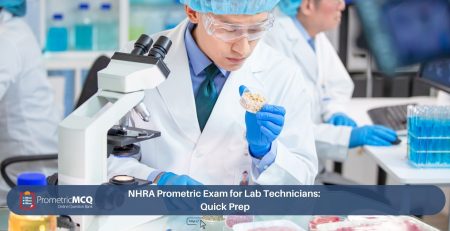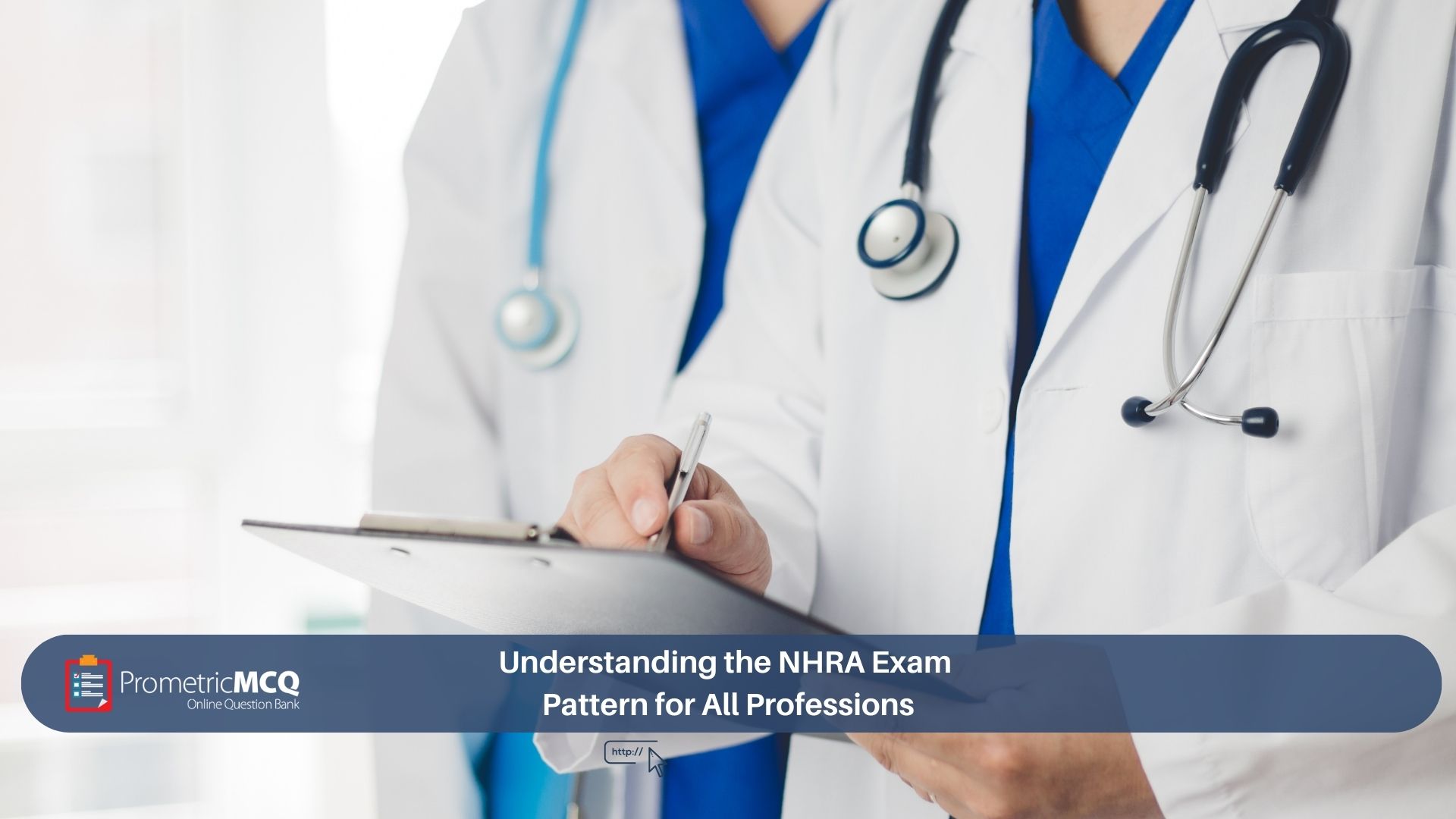
Understanding the NHRA Exam Pattern for All Professions
fatima@prometricmcq.com2025-09-18T19:21:46+00:00Table of Contents
ToggleUnderstanding the NHRA Exam Pattern for All Professions (2025)
The Kingdom of Bahrain’s healthcare sector is a beacon of quality and advancement in the Gulf region, attracting top medical talent from around the globe. Central to maintaining these high standards is the National Health Regulatory Authority (NHRA), the body responsible for licensing all healthcare practitioners. For any professional—be it a doctor, nurse, dentist, pharmacist, or allied health specialist—the NHRA licensure exam is the definitive gateway to practicing in the Kingdom. Understanding the pattern of this exam is the first and most critical step in the journey to a successful career in Bahrain.
While the specific content varies widely between professions, the fundamental structure and philosophy of the NHRA exams share a common framework. They are designed not as academic hurdles, but as robust assessments of clinical competence, critical thinking, and a practitioner’s ability to ensure patient safety in a real-world setting. Demystifying this exam pattern is essential for creating a targeted, efficient, and successful study plan.
This ultimate 2025 guide provides a comprehensive, multi-professional overview of the NHRA exam pattern. We will dissect the universal format and then delve into the specific nuances for doctors, nurses, dentists, pharmacists, and various allied health fields. This article will serve as your strategic blueprint, complete with a detailed 10-point FAQ section to provide clarity on every aspect of the examination process. Our goal is to empower you with a clear, holistic understanding, transforming anxiety into a confident plan of action.
Key Takeaways on the NHRA Exam Pattern
- Universal Format: All NHRA exams are Computer-Based Tests (CBTs) consisting of Multiple-Choice Questions (MCQs), administered by Prometric.
- Standard Structure: Most exams consist of 150 MCQs to be completed in 3 hours (180 minutes).
- No Negative Marking: Your score is based on the number of correct answers. It is always advantageous to attempt every question.
- Pass/Fail Outcome: The NHRA provides a simple “Pass” or “Fail” result, not a numerical score. The unofficial passing mark for most professions is around 60%.
- Focus on Clinical Application: Across all professions, the exam emphasizes clinical scenarios and problem-solving over rote memorization of facts.
The Universal NHRA Exam Framework for 2025
While each profession has a unique syllabus, the underlying structure of the test is consistent. Acknowledging these universal truths is the foundation of effective Bahrain NHRA exam preparation.
1. Test Administrator: Prometric
The NHRA has partnered with Prometric, a global leader in test administration, to conduct its licensure exams. This means you will take the exam at a secure, standardized Prometric test center, which can be found in major cities worldwide. Familiarize yourself with the Prometric environment and procedures to minimize exam-day stress.
2. Format: 100% Multiple-Choice Questions (MCQs)
There are no essays, short answers, or practical components in the licensure exam. Every question will be an MCQ, typically with four answer options (A, B, C, D) and only one correct choice. The questions are designed to test your knowledge at various cognitive levels, from recall to application and analysis.
3. Duration and Pacing
The standard format of 150 questions in 180 minutes gives you an average of 1 minute and 12 seconds per question. This timing is deliberate; it requires both accurate knowledge and efficient test-taking skills. You must be able to read, analyze, and answer questions at a steady pace without getting bogged down on any single item.
4. Scoring System
As mentioned, the exam is graded as Pass/Fail. The NHRA sets a minimum standard of competency for each profession, and your performance is measured against this benchmark. This is known as criterion-referenced testing. It is not a competition; your ability to pass is independent of how others perform. Crucially, there is no penalty for incorrect answers, so you must never leave a question blank.
NHRA Exam Pattern: A Detailed Breakdown by Profession
Now, let’s explore the specific focus areas and nuances for each major healthcare profession.
Doctors (General Practitioners & Specialists)
The physician exams are among the most challenging, demanding a broad and deep clinical knowledge base.
- Core Focus: Diagnosis, differential diagnosis, and management based on clinical presentation, lab results, and imaging.
- Syllabus Emphasis: For General Practitioners, the exam covers all major fields of medicine: Internal Medicine, Pediatrics, OB/GYN, Surgery, Psychiatry, and Emergency Medicine. For Specialists, the exam is a deep dive into their specific field, testing advanced concepts and the latest evidence-based guidelines.
- Question Style: Expect long-stem, case-based questions that present a patient vignette. You will be asked to determine the most likely diagnosis, the next best step in management, the most appropriate diagnostic test, or the drug of choice.
- Passing Score: The estimated passing score for physicians is typically in the range of 60-65%.
Dentists (General Dentists & Specialists)
The dental exams are highly visual and require strong diagnostic skills, particularly in radiographic interpretation.
- Core Focus: Accurate diagnosis of dental and oral conditions, comprehensive treatment planning, and dental materials science.
- Syllabus Emphasis: The exam for General Dentists covers all domains: Operative Dentistry, Endodontics, Prosthodontics, Periodontics, Oral Surgery, Pedodontics, and Oral Pathology. Specialist exams focus intensely on one area, such as orthodontics or implant dentistry.
- Question Style: Many questions are case-based and may include dental radiographs (periapical, OPGs) or clinical photos. You will need to identify pathologies, formulate treatment plans, or choose the most appropriate dental material for a given situation.
- Passing Score: The unofficial passing benchmark for dentists is estimated to be around 60-65%. For more resources, you can explore general dentistry MCQs.
Nurses
The nursing exams are heavily centered on patient safety, prioritization, and the application of the nursing process.
- Core Focus: Patient safety, prioritization of care, delegation, infection control, and pharmacology calculations.
- Syllabus Emphasis: The exam covers the full spectrum of nursing care, including Fundamentals, Medical-Surgical, Pediatrics, Maternity, and Mental Health nursing. A significant portion is dedicated to patient safety goals and ethical practice.
- Question Style: Most questions are scenario-based. A common format is the “priority” question, asking which patient the nurse should see first or what action is most critical. Delegation questions (what can be delegated to an assistant) are also frequent.
- Passing Score: The estimated passing score for nurses is generally around 60%.
Pharmacists
The pharmacy exam is a blend of clinical science, calculations, and local law.
- Core Focus: Clinical therapeutics, pharmaceutical calculations, and Bahrain-specific pharmacy laws and regulations.
- Syllabus Emphasis: Major domains include Pharmaceutical Sciences (pharmacology, pharmaceutics), Clinical Pharmacy (pharmacotherapy), and Pharmacy Practice (dispensing, counseling). A critical and unique component is the section on Bahrain’s pharmacy laws.
- Question Style: Expect a mix of clinical cases requiring you to recommend therapy, stand-alone pharmacology questions, complex calculation problems (dosages, dilutions), and questions about the legal requirements for dispensing controlled substances in Bahrain.
- Passing Score: The passing threshold for pharmacists is estimated to be 60%. A thorough review using a pharmacy MCQ bank is essential.
Allied Health Professions (Physiotherapy, Lab Tech, Radiography)
This diverse group is united by a focus on technical proficiency, patient safety, and discipline-specific diagnostics.
- Core Focus: – Physiotherapists: Musculoskeletal and neurological assessment, special tests, and rehabilitation protocols. – Lab Technicians: Principles and procedures in all lab sections (hematology, microbiology, chemistry), quality control, and safety. – Radiographers: Patient positioning, radiation protection (ALARA), and image quality factors.
- Question Style: Questions are highly practical and scenario-based, testing your ability to apply theoretical knowledge. For example, a physiotherapist might be asked to select the most appropriate special test, a lab tech to identify a potential cause for an erroneous result, or a radiographer to correct an exposure factor.
- Passing Score: For most allied health professions, the estimated passing score is in the range of 55-60%.
Frequently Asked Questions (FAQs) on the NHRA Exam Pattern
Yes, the exam pattern, syllabus, and passing standard are the same for all candidates, regardless of their nationality or where they obtained their degree. The NHRA’s goal is to ensure a single, high standard of care for all practitioners in Bahrain.
Any unanswered questions at the end of the 180-minute period will be marked as incorrect. Because there is no negative marking, it is crucial to manage your time effectively and ensure you answer every single question, even if you have to make an educated guess on the last few.
Yes, the Prometric testing software allows you to navigate forward and backward through the questions. You can also “flag” questions that you are unsure about and return to them later if time permits. This is a key feature to use in your time management strategy.
You will receive your Pass/Fail result immediately on the computer screen upon completing the exam. A printed score report will also be provided at the test center. An official confirmation is typically updated on your NHRA profile within a few business days.
Absolutely. The NHRA exams are based on international, evidence-based best practices. Guidelines from major global health organizations like the American Heart Association (AHA), the World Health Organization (WHO), and other leading international bodies are the foundation of the clinical content. You can find many such resources on the WHO’s official website.
Primary Source Verification (PSV) by the DataFlow Group is a mandatory background check to verify the authenticity of your qualifications. While some candidates start this process before the exam, it must be completed with a positive report before the NHRA will issue your final license to practice.
Yes. Before your exam begins, you will be given a short, optional tutorial on how to use the computer-based testing interface, including how to select answers, navigate between questions, and flag questions for review. It is highly recommended to take these few minutes to familiarize yourself with the system.
The consensus among successful candidates across all professions is consistent: practice with a high-quality, timed question bank (QBank). This strategy helps you master the content, understand the question style, and perfect your time management skills, which are all critical for success.
To book your exam, you will typically need an eligibility number or approval from the NHRA, which you receive after submitting your initial application. You will also need your valid passport to complete the booking with Prometric.
Finding practice questions that are tailored to your specific profession and mirror the style of the NHRA exam is key. A comprehensive platform that offers dedicated QBanks for various specializations is your best asset. You can explore a wide range of options at the MCQs Packages page.
Conclusion: A Unified Path to a Bahrain Career
While the knowledge required for each healthcare profession is unique, the pattern of the NHRA licensure exam provides a common framework for success. It is a fair, consistent, and clinically focused assessment designed to identify competent and safe practitioners. By understanding this universal pattern—the CBT format, the MCQ style, the critical importance of time management, and the emphasis on clinical application—you can build a study plan that is both efficient and highly effective. Master the pattern, master your content, and you will be perfectly positioned to pass your exam and begin a successful healthcare career in the Kingdom of Bahrain.
Ready to Master the Pattern and Ace Your Exam?
Our comprehensive MCQ packages are tailored for every major healthcare profession, providing thousands of high-yield questions, detailed rationales, and simulated exams to build your knowledge and guarantee your success.

